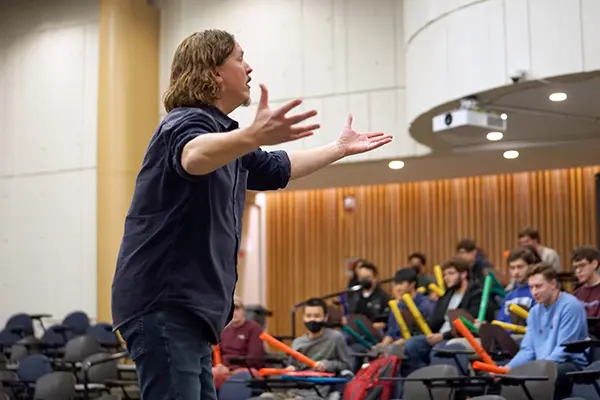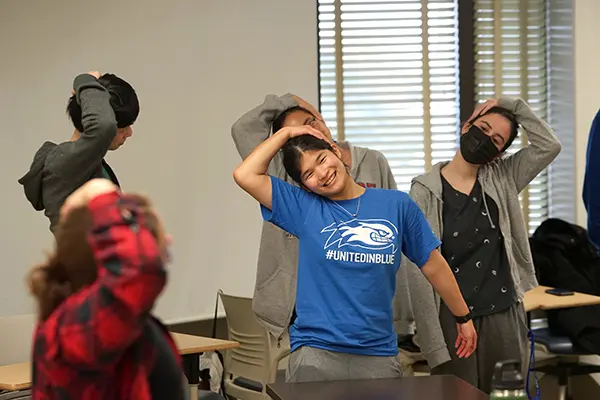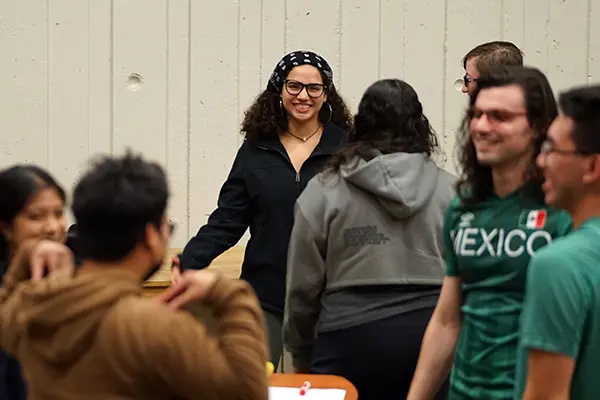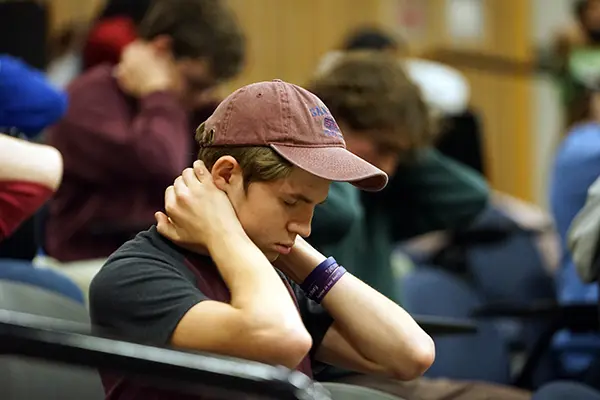Honors College Teams Up with UMatter2 to Share Strategies, Services
 Image by Ed Brennen
Image by Ed Brennen
10/31/2022
By Ed Brennen
Encountering a conga line of 50 grinning students, all banging colorful plastic tubes together in the hallway outside the O’Leary Library auditorium on a recent Friday afternoon, first-year Honors College students Brady Gleason and Ben Height wondered what they were getting themselves into.
“Oh, no,” Height thought as he and his roommate arrived a few minutes late for the guest lecture by Jim Donovan, director of music and wellness at St. Francis University in Loretto, Pennsylvania, and founding member of multiplatinum worldbeat rock band Rusted Root.
“We were so confused,” Gleason said.
Their trepidation and confusion quickly disappeared, however, during Donovan’s engaging two-hour presentation on mindfulness and stress management — the culminating event of the Honors College’s inaugural “Honor Yourself Week.”
“It was amazing,” said Height, who hadn’t planned on staying for the entire talk but found himself so “entranced” by the experience that he didn’t want to leave.
 Image by Ed Brennen
Image by Ed Brennen
Designed with honors students in mind but open to all UML students, faculty and staff, the week featured a stretching session at Olsen Hall, pumpkin painting at the Allen House and a health and wellness resource fair at University Crossing.
Students in the First Year Honors Seminar learned about the eight dimensions of wellness from Melissa Wall, UMatter2’s director of prevention and education, and Diana Dellogono, associate director of fitness and facilities for Campus Recreation. Students were encouraged to design their own wellness plans and were invited to sign up for a free two-month subscription to the meditation app Ten Percent Happier.
“Getting students to think about mental health issues early in their college careers — how they can help each other and help themselves — is ideal,” said Wall, who finds that repeating the message to students is also important. “It might not be on their radar right now, they might feel like they have things managed, but maybe later on, they can find the resources useful.”
Reservoir of Resilience
Donovan is the former drummer for Pittsburgh-based Rusted Root, whose 1994 hit “Send Me On My Way” appeared in the movies “Ice Age” and “Matilda” and was the first song played on Mars when NASA engineers used it as the “wake-up” music for the Opportunity rover in 2004.
 Image by Ed Brennen
Image by Ed Brennen
Others have found the exercise helpful, too. Donovan’s 2018 TedX Talk on his “brain tapping” technique, “How to Trick Your Brain into Falling Asleep,” has been viewed more than 6.4 million times.
“Rhythm is a beautiful thing. It hijacks the brain in a way, causing the brain to track it,” Donovan said in explaining the “frequency following response” to students. “The technique is good for sleep, but it’s also good for times when you need to be highly focused, maybe before an exam or when you’re going into a job interview.”
Donovan led students through other “weird hippie stuff,” including movements to help them lower their cortisol, the body’s stress hormone, and humming exercises to stimulate the vagus nerve, the system that controls the body’s digestion, heart rate and immune system.
 Image by Ed Brennen
Image by Ed Brennen
“The education you’re getting is important, but what’s equally, if not more, important is what you learn about how to balance your work and the way that you take care of yourself,” he said. “You’re at the age where you can do almost anything and somehow bounce back. Over time, though, that gets less and less true. We don’t bounce back as fast, and when we stop bouncing back, it makes it easier to get sick.”
Despite his unease when arriving at the lecture, Gleason, a business major from Nashua, New Hampshire, was glad he attended.
“Everything he said resonated with me so much,” he said. “I fell into focus so quickly with the tapping exercise. It was incredible.”
Junior business major Davina Mwangi, who works as an Information Peer for the Honors College, enjoyed getting out of her comfort zone through activities such as the conga line and engaging with students she hadn’t met before.
“Student wellness matters,” said Mwangi, an international student from Kenya. “People have a lot of pressure with classes, and they need a break to decompress.”
That was particularly true for Nathaly Mateo, a senior art major from Boston, who personally thanked Donovan for his talk afterward.
“I got some really sad news before coming here, and I didn’t know what to do,” said Mateo, who felt “way better” after trying some of Donovan’s wellness techniques. “I feel like the universe was telling me, ‘Go there. You’re stressed.’”
